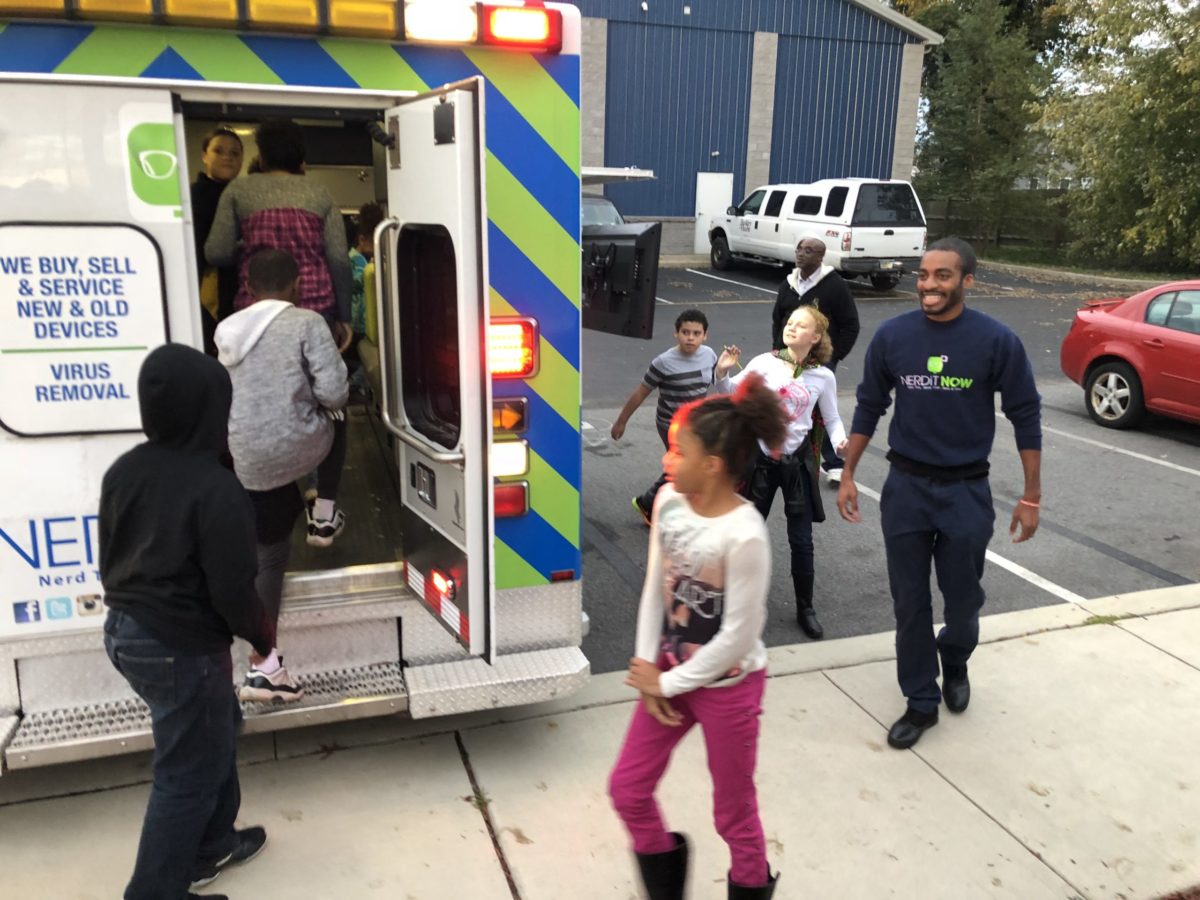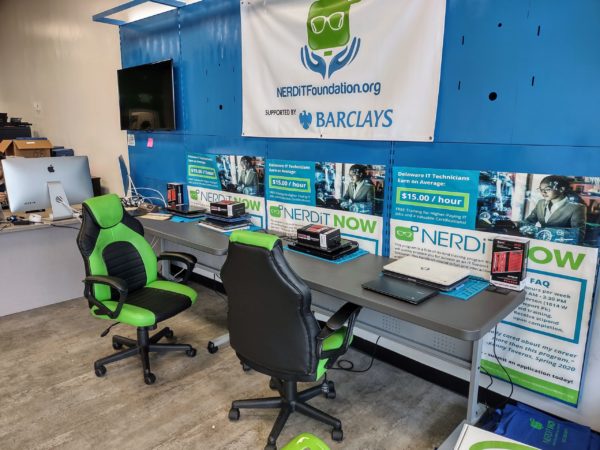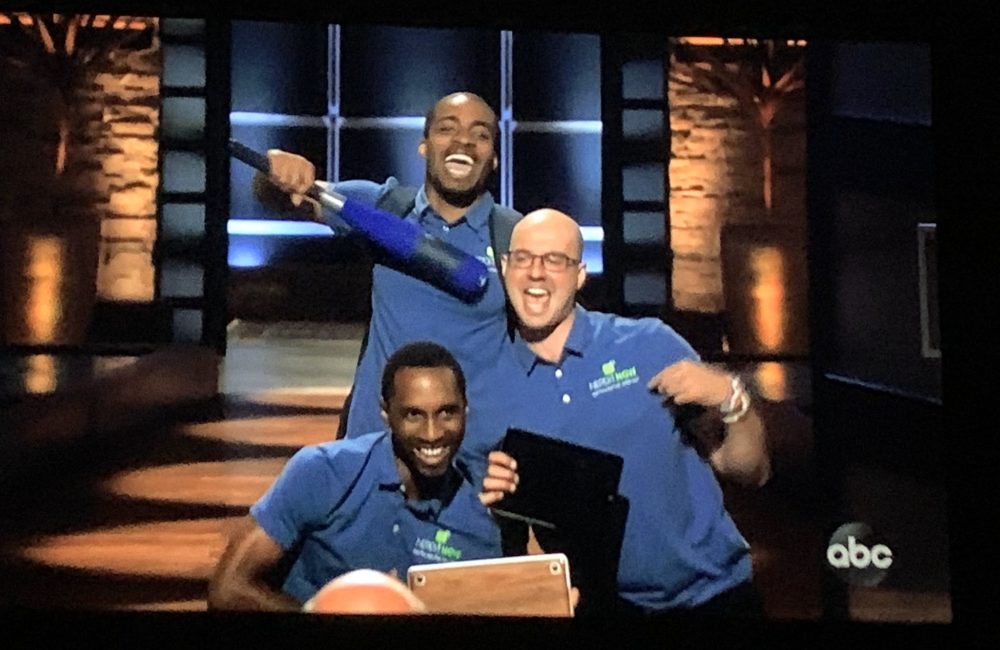Just over a year ago, NERDiT Now founder Markevis Gideon was wondering how he was going to keep the lights on in his First State Plaza retail location.
Always known for giving back to the community, his NERDiT Foundation refurbished and gave away hundreds of laptops to kids who needed them as schools closed and classes went digital following the COVID-19 lockdown. Thanks to grants specifically for the laptop giveaway, he was able to continue doing that as the pandemic progressed. But the “Shark Tank“-featured device repair business itself was suffering.
NERDiT NOW didn’t receive Paycheck Protection Program (PPP) funds in the first round — or the second round, since by that point, the company was making more money than it had been pre-pandemic, disqualifying it as in need.
How did the business go from struggling to support three employees to quietly growing to having 17 people on the payroll with active plans to increase hiring? It’s been quite a year full of changes, including the exit of former managing director Jake Voorhees, who took part in the “Shark Tank” pitch, in March. (“We’re still friends,” Gideon said.)
“I’ve been quiet,” Gideon told Technical.ly in the back room of the store, his 5-month old son, Noah, strapped to his front. He was showing me the fleet of trucks from the back door. There’s the branded ambulance — one of the early NERDiT Now concepts — but now there are bigger trucks, and not just for house calls and office visits.
“We are now the first certified R2 recyclers of IT equipment in the state of Delaware,” he said, pointing to a large truck used to pick up used computers, printers, laptops and tablets. The license was something he’s had his eye on for a while, but it’s difficult and costly to get one.
“It was expensive to get the certification, about an eight-month process, but I’ve been trying to do this for five years, I just never had the capital to do it,” Gideon said. “The moment I got the capital — let’s go.”
Three grants in particular helped: a $75,000 grant from Discovery Bank to help distribute refurbished devices to kids in need during the early days of the pandemic, a $25,000 grant from Capital One and a $100,000 grant from Barclays.
“When the pandemic came, I said, ‘Instead of giving 100 computers this year, I’m going to do it this month to show that we’re gonna be OK, and you’re gonna be OK, too,'” Gideon said. “When I did that, we got a grant from Discover Bank partnering with [Delaware Alliance for Nonprofit Advancement] and were able to provide over 200 computers right away. I was like, oh, this is blessed. Hours later, I got a call from Capital One, then Barclays came with 100K. It was like a windstorm to help communities throughout the city. So my 100 computers turned into thousands immediately.”

The discarded computers and laptops from companies when they upgrade to newer devices are perfect for refurbishing. The desktop towers, especially, are tough enough to handle a whole household’s worth of schoolwork and Zoom meetings, unlike the Chromebooks given out by schools that are not intended to handle more than one child’s homework.
“Desktops are always better in homes with parents and kids using the same computer,” Gideon said.
He has plans to open up a recycling center in Wilmington, as well as a downtown location for NERDiT’s IT training program, which launched in 2020 — developed in response to feedback received on “Shark Tank” — and is responsible for the company’s employee growth.
For now, all of it — the retail store, the training classroom and the recycling and distribution center — are all located in First State Plaza, just doors apart. There was vacant space, and he was able to work out an arrangement as the company grows. It’s convenient, but Gideon looks forward to moving everything but the flagship store to the city.
“We need to be accessible to the community we serve,” he said, noting that only one DART bus stops near the Newport shopping center from Wilmington. The training program will be downtown, while he’s looking at a warehouse location in Riverside for the recycling center.
While he’s as committed to serving the community — which he hopes to eventually include Kent and Sussex counties as well — as ever, Gideon plans to move away from the org’s nonprofit arm.
“My goal is to one day not need 501(c)(3) status,” he said. “That does not mean that I want to give away our charitable giving because that’s what the company started with. The company will always be focused on giving to the community. But at the same time, I want the company to be profitable enough to be able to give so much more.”
That includes living wage and higher jobs, and lots of them, in communities where more work and more opportunities to build wealth are needed if they’re going to thrive.
“Here at NERDiT Now we’re intentional on closing three divides: digital, income and wealth,” Gideon said. “With the digital divide, we donate technology, and we train individuals to get employable skills within tech, therefore closing that income divide.”

The wealth divide is more complicated. Tackling it, he says, means talking about the long road after graduation — one that will mean less money right out of training compared to getting a job with a larger company.
“Our goal is not for you to come in and become a technician or just a manager,” he said. “We want to close that wealth divide, meaning we train you and then offer you the opportunity to open up your own NERDiT Now in the community.” He imagines graduates opening NERDiT Now locations in their own neighborhoods in Wilmington, Dover, Georgetown and beyond.
And for people who want a decent jobs instead of running a business, there will be those, too, not just in the recycling center and the retail stores, but in manufacturing. Remember the branded kiosks NERDiT Now presented as part of their “Shark Tank” pitch? They’re still part of the business model. There are for-profit kiosks being manufactured that will be placed in corporate centers, and new community center versions where companies can sponsor a box with their branded advertising, offering free repairs to low-income patrons. The advertising pays for 100 repairs; after that, other companies can buy ads on a built-in screen to fund more.
Currently, the kiosks are being manufactured in Germany. But as it grows, Gideon intends to move the manufacturing to Delaware.
“We brokered a deal with the manufacturer that once we get an order for 50 to 100 kiosks, we’ll move the manufacturing to America — more specifically Delaware,” Gideon said. “So all those jobs are coming here. The company that’s manufacturing will oversee it, but we’re going to hire locally, preferably in an underserved community. I’m not talking paying minimum wage — no, we want people to get real employment. I want my son to feel comfortable walking through Southbridge or some of the streets I grew up on. How do we make it safe for my son? By providing jobs and opportunities.”








